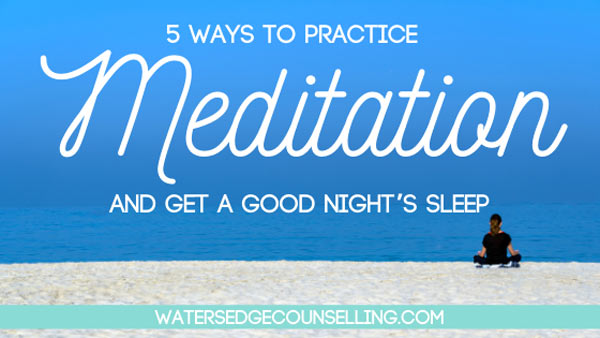
Oftentimes, anxiety makes its way into our daily lives. It could be the result of work stress, difficult relationships, a sudden move, or a tragedy. And although this anxiety manifests in different ways, one common result is insomnia.
While there are varying medications and traditional therapies available to treat this disorder, a natural remedy worth trying is meditation. Scientific studies have even confirmed that the right meditation practices can be effective treatments for stress-induced insomnia. Here are five type of meditation you can try at home.
1. Mindfulness meditation
Mindfulness meditation is all about being present in the moment. As you practice, you should be able to block out external distractions and worries, and instead create a space where you can simply breathe and be.
- Find a comfortable, safe place where you can sit and relax.
- Set a time limit for yourself; if you’re just getting started, 10 minutes is fine.
- Find a seated position where you can remain steady and still, whether that’s sitting cross-legged, kneeling, or something else.
- Feel your breath. Be attentive to each inhale and exhale.
- Notice as your mind wanders; and when you do, direct it back to your breathing.
- Be kind to yourself. Don’t judge yourself for a wandering mind; instead, just come back to the breathing.
2. Progressive muscle relaxation (PMR)
When you feel stressed, it causes tension throughout your body. PMR is a relaxation technique that allows you to relieve that tension; it works when you engage and then release one muscle group at a time. Some tips for getting started:
- Work your way down through your entire body.
- Start with your forehead, then jaw, then shoulders, etc.
- Breathe in, and then gently but deliberately tense one muscle group as hard as possible. This may cause shaking or discomfort, but shouldn’t cause pain.
- As you exhale, quickly and fully relax the tensed muscle group.
- Rest for about 30 seconds.
- Follow this pattern for each muscle group, working your way down the body and maintaining mindfulness of your breathing.
3. Body scan meditation
Body scan meditation is another way of releasing tension. It’s all about conducting a mental “scan” of your body, one body part at a time. Simply stop to observe bodily sensations in sequence, moving from your head down to your feet.
- Start out in a comfortable position, preferably lying down.
- Develop some slow, steady breathing.
- Bring awareness to the first body part; acknowledge any pain or other physical sensations. Continue to breathe.
- Visualize the tension leaving your body throughout the scan.
- Continue the scan, steadily and methodically, down your whole body.
4. Guided meditation
Guided meditation allows you to achieve relaxation and stress release through the direction of a guide. This may be a real-life person, who guides meditation in a group setting, or it may be a recording you play from your phone or computer.
- If you use an app or recording, we’d invite you to shut off all other notifications, or to put your phone on airplane mode (if possible).
- Find a space where you can sit, kneel, or lie down comfortably. The goal here is to be relaxed, but not to fall asleep.
- Close your eyes, breathe normally, and allow your guide to handle it from there.
5. Affirmation meditation
Through affirmation meditation, you can quiet your mind and relieve stress by bathing yourself in positivity. This practice is all about focusing your attention on a motivating or empowering phrase or mantra.
- Start by thinking about what you’d like to change, or what you’d like more of in your life. If you struggle with self-doubt, you might want to choose a mantra along the lines of “I am good enough,” or “I am worthy,” or “I can do beautiful things.”
- Make sure your affirmation is filled with positive words for your brain to wrap itself around. For instance, “I am strong” is much more effective than “I am not weak.”
- Also ensure you’re focusing on the present. “I am strong” works better than “I will be strong.”
- As you repeat your mantra to yourself, close your eyes and practice natural breathing. Try to visualize a positive scene that’s connected to your affirmation; a scene in which you are happy, empowered, etc.
Do you struggle to sleep? Do you feel stressed? Here’s what you need to do: Contact Colleen on 0434 337 245 or Duncan on 0434 331 243 for a FREE 10 minute consultation on how we can best help you or book online now.
This blog comes from the article ‘A Guide to Sleep And Meditation’ by Sleepopolis and was republished with permission. Read the original article here.
Leave a Reply